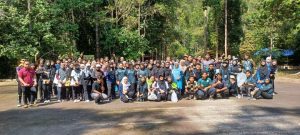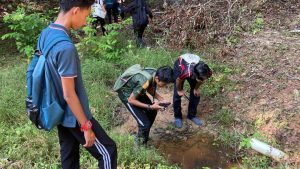
The idea behind the “Khazanah Alam Campus Challenge” is citizen science, which is the voluntary involvement of non-professional scientists in collaborative scientific research projects. This approach makes research more transparent, which improves accessibility and encourages public participation. Academic libraries, like UiTM Pahang’s Al-Bukhari Library, play a crucial role in the current environment. Libraries serve a dual purpose by acting as active learning and research facilitators in addition to being repositories of knowledge. Libraries are essential in supporting citizen science initiatives because they provide people with access to a wide variety of resources, organise educational initiatives, and offer venues for community engagement.
The “Khazanah Alam Campus Challenge,” held at Universiti Teknologi MARA (UiTM) Cawangan Pahang Kampus Jengka from October 27, to November 10, 2023, was an impressive initiative to promote citizen science both inside and outside of the university. With a focus on biodiversity and environmental awareness, the event served as a platform to highlight the significant impact academic libraries can have in promoting scientific literacy and research.
The challenge had two main objectives. The first was raising awareness of the importance of citizen scien

ce among the UiTM Cawangan Pahang community and the general public. Furthermore, this effort aimed to increase the visibility of Al-Bukhari Library in the field of Citizen Science in Biodiversity. Thus, a collaborative effort between the University Malaya Sustainability and Development Centre (UMSDC), the Faculty of Plantation & Agrotechnology, ORBID – the Organization Biodiversity Club, and the Al-Bukhari Library at UiTM Pahang resulted in this programme.
Through its initiatives to promote biodiversity education research and environmental awareness, the “Khazanah Alam Campus Challenge” significantly contributes to the advancement of Sustainable Development Goals (SDGs) such as SDG 4 (Quality Education), SDG 15 (Life on Land), and SDG 17 (Partnerships for the Goals). This program promotes a deeper understanding and engagement with these SDG goals in addition to motivating staff and students to actively participate in citizen science efforts. Involving the university community in conservation and research projects promotes personal responsibility and makes it easier for people to directly contribute to the SDGs’ realization. Between theoretical academic understanding and practical, real-world implementation, citizen science acts as a bridge, ensuring that the effort to accomplish these goals is extensive, collaborative, and impactful. Furthermore, the academic libraries that are housed within these academic institutions serve as central repositories of information and materials that support educational and research activities related to biodiversity and sustainability. In doing so, they contribute significantly to the advancement of SDG-aligned citizen science initiatives.
This programme was initiated with an engaging training session on the iNaturalist application, led by En. Affan Nasaruddin from UMSDC. The participants of this session gained the skills they needed to efficiently document and observe biodiversity through the use of citizen science technologies. Following the training, the participants went on to conduct an exploration project in Sri Gading Camp, applying their newly acquired skills to document a diverse range of species. The initial inquiry was part of a larger project that lasted for several weeks and involved people documenting various forms of biodiversity within the campus vicinity.
The noteworthy results of the “Khazanah Alam Campus Challenge” were demonstrated by the collection of 997 observations and the identification of 499 distinct species. This achievement was made possible with the active participation of 52 observers and 117 identifiers. One person who distinguished herself among the dedicated individuals was Siti Hawa binti Shamsudin, whose notable contribution consisted of 310 observations. The subsequent observer who made an Interesting Discovery was Mohd Ismail bin Zainudin, while the individual responsible for capturing the Stunning Image was Muhammad Khairul Daniel bin Abd. Halim. These people’s extraordinary commitment was an excellent illustration of the impact that citizen science initiatives could have, substantially enhancing our understanding and documentation of regional biodiversity. They not only demonstrated the program’s effectiveness in obtaining participation and gathering data but also highlighted the potential of citizen science initiatives to enhance biodiversity research and promote awareness.
In conclusion, the “Khazanah Alam Campus Challenge” serves as an excellent example of the important role academic libraries can play in promoting scientific literacy and facilitating research projects. Institutions like UiTM Cawangan Pahang are playing a significant role in the community by providing the knowledge and abilities needed for people to actively engage in scientific research; thus, fostering an informed and environmentally conscious society.
